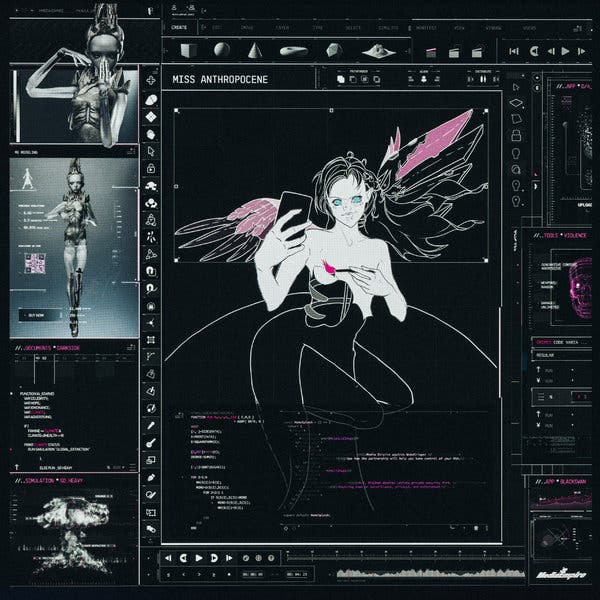Grimes finds herself by losing herself: in concepts and characters and costumes, in surreally larger-than-life music, in overarching ideas and omens of apocalypse. That doesn’t stop her from being playful, hedonistic or perverse when she chooses. “We party when the sun goes low/Imminent annihilation is so dope,” she chirps in “My Name Is Dark,” a souped-up neo-grunge rocker she released to preview “Miss Anthropocene,” her fifth album. Soon she adds, “You know me as the girl who plays with fire,” ending the phrase with a scream. The album cover shows a winged, Grimes-like cartoon figure holding a candle as she apparently takes a selfie.
Grimes, 31, is the Canadian songwriter Claire Boucher, who is also a one-woman studio band, producer, engineer, graphic artist and video director. (She does allow guest mixers on “Miss Anthropocene.”) Grimes was also a fashion adventurer and a fount of social-media content long before the Tesla mogul Elon Musk became her boyfriend and she seemingly announced, with Twitter and Instagram photos in January, that she is pregnant.

Grimes emerged from the arty side of electronic pop on her early albums, mingling her voice with lo-fi electroacoustic constructions. Since her third album, “Visions” in 2012, she has operated in increasingly polished pop song forms packed with subtext. Her verses and choruses are neatly delineated and laced with hooks, though her concerns are rarely straightforward. Her voice is usually high and piping, conveying a girlish innocence that her lyrics often cheerfully belie. Her music fully exploits the possibilities of the digital studio: looping and layering, sampling and manipulating, smashing together disparate sounds and genres, mixing sweetness and abrasion.
“Art Angels,” her 2016 album, was giddy with possibilities, flaunting high-impact beats and juggling thoughts about art, fame, gender roles and cultural impact. In her videos, Grimes has been a sword-wielding warrior, a comic book superheroine, an angel, a schoolgirl, a blood-drenched 18th-century aristocrat and an assortment of spiky-outfitted, talon-fingered sci-fi fashionistas.
“Miss Anthropocene” is more somber. It’s full of dire scenarios, deep bass abysses and floating soprano refrains. The album, Grimes said in Interview, is “a modern demonology or a modern pantheon where every song is about a different way to suffer or a different way to die.” Miss Anthropocene is the goddess of climate crisis; the Anthropocene era is the epoch of human domination of the Earth.
No Miss Anthropocene is mentioned directly in any of the songs, but a sense of impending doom fills most of the album: to be worried over in complicity, met head-on, mourned or sardonically embraced. “This is the sound of the end of the world,” Grimes sings in “Before the Fever,” a murky, resolute waltz. The album’s most straightforward song, “Delete Forever,” addresses the deaths of opioid addiction. Over folky guitar chords (sampled not strummed) and later banjo and drums, Grimes dips into her lower register and admits to both her own temptations with drugs — “I did everything/More lines on the mirror than a sonnet” — and the grim results she has seen in her generation.
Grimes doesn’t make her songs depend on the words. The nervous energy, dread, anxiety, death wish and poppy nihilism are also in the sound of her music. Throughout “Miss Anthropocene,” personal and societal disasters seem imminent.
“New Gods” longs for deities who might offer salvation from catastrophe — “I pray but the world burns,” Grimes sings — but new, dark spaces keep opening outward under its hesitantly stately chords. The intro to “4ÆM” suggests an intersection of Baroque opera and Bollywood, with a feathery high melody over delicate arpeggios; then a brisk rock beat charges in and a nasal horde of Grimes’s voices mimics an attack of insomniac jitters, announcing, “You’re gonna get sick — you don’t know when.”
“Violence,” a collaboration with the producer i_o, is a queasy mixture of plea, flirtation, warning and dance tune, suggesting a sadomasochistic relationship or a mutual self-destruction pact: “You feed off hurting me,” Grimes sings, but later boasts, “I like it like that.” Her voice hovers far above the rhythm track, a little like Donna Summer in “I Feel Love,” but with far less promise of bliss.
There is an Edenic moment on the album. “Idoru” begins with bird calls and little hoots from what sounds like an Asian mouth organ, and expands into rippling Minimalistic patterns of overlapping instruments and vocals. Grimes wafts her most guileless voice to urge, “We could play a beautiful game/You could chase me down in the name of love.” But the object of her affection is a mass-market fabrication. “Idoru” is the Japanese word for a groomed, manufactured pop idol, a new god intended for consumer worship; it’s also the title of a William Gibson novel about an artificial, holographic pop star. The singer knows that her love is a hopeless illusion, and pretty as the music is in the moment, it can’t stave off the inevitable.
Grimes
“Miss Anthropocene”
(4AD)
 EU News Digest Latest News & Updates
EU News Digest Latest News & Updates



